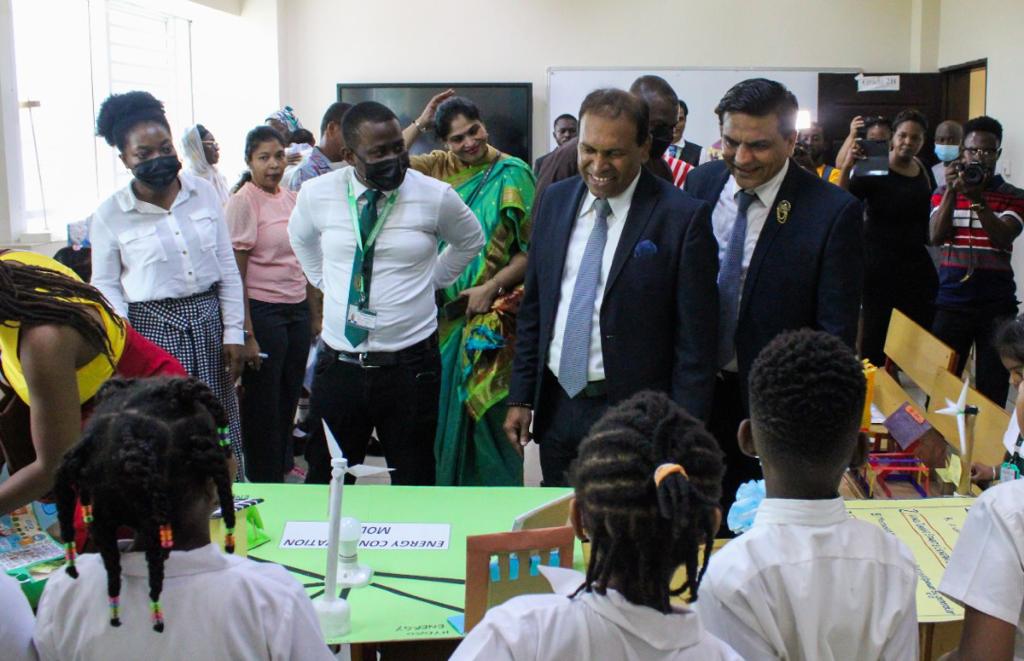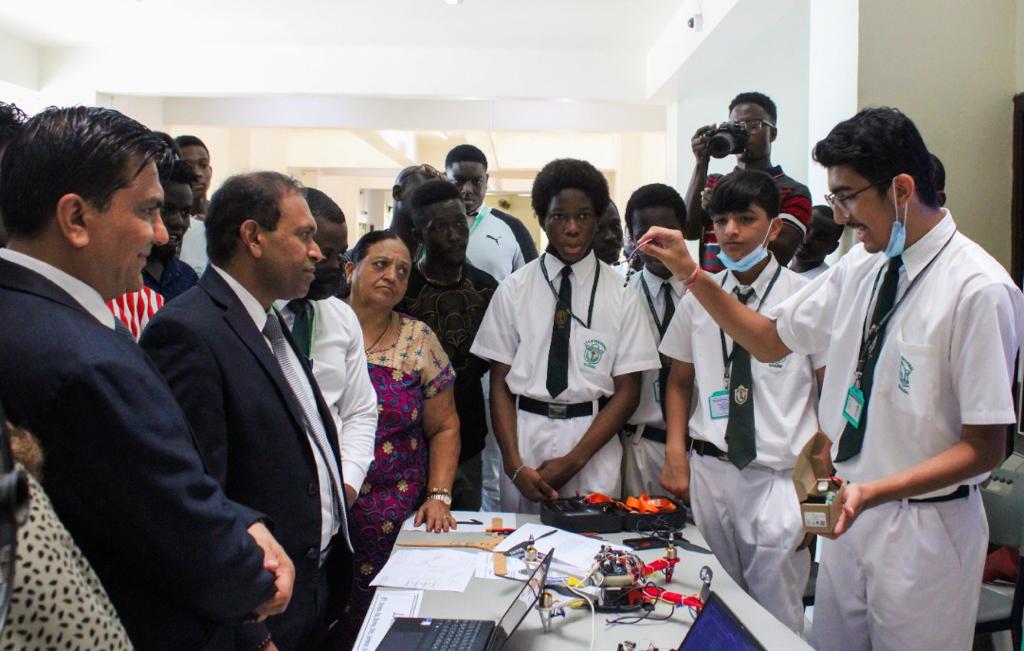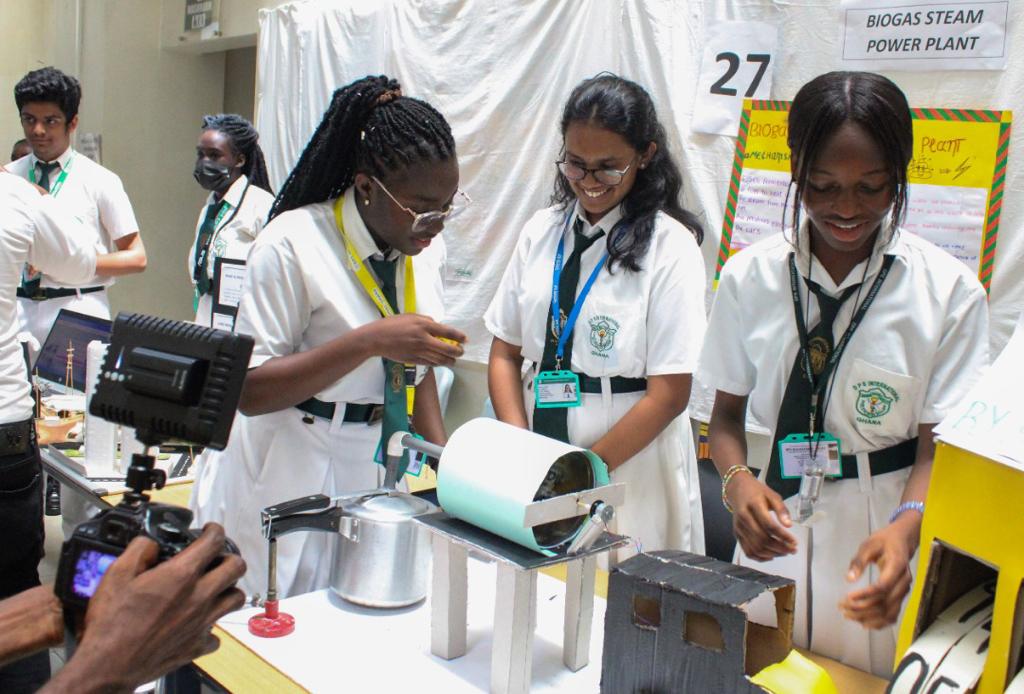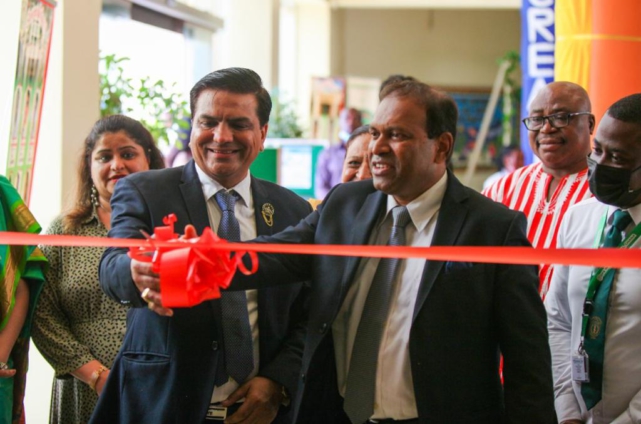Indian High Commissioner, Sugandh Rajaram said his country will continue to cooperate with Ghana in different areas including innovation and technology for the sustainable growth and development of both countries.
He disclosed this in an interview at a Science fair at DPS International in Tema where students exhibited innovations that will drive the future.
“Innovation and skills remain priority areas of our cooperation. We’re working with the authorities and all stakeholders in Ghana to ensure that new development, capacity building and ideas are implemented here,” he stated.

The science fair which was on the theme; 'Sustainable Solutions for a Sustainable Future', saw students exhibiting innovations in the area of security, health, agriculture, energy, and sustainable cities but just to mention a few.
Sugandh Rajaram was highly impressed with the out-of-the-box thinking projects displayed.
According to him, educational institutions are an important part of both countries’ development particularly innovation, research, startups and other futuristic orientation.
“If we get the cooperation of educational institutions like DPS International in this effort, I think it will be a catalyst in the expedition of the cooperation,” he stated.
He commended the children and school authorities and encouraged the children to continue making the most out of the platform provided them.
One of the major highlights of the exhibition was a drone built to help firefighters.
The project (JARVIS) built a drone with 20,200 revolutions per minute (rpm) motors giving 4kg of thrust with its 10-inch propeller compared to a conventional drone with only 100-200 rpm motors.
The drone has features including facial recognition and identification and will help firefighters rescue persons who are trapped by flying into the fire and sending information wirelessly back to the firefighters within a minute.

This innovation is to help avoid instances where firefighters enter a building with no idea of how many people and where they may be.
Shriman Jha, Raj Thakwani, Ernest Mintah, Chris Amankwah, Semekor Pi-Bansa, and Barima Yaw Ofori-Boateng Kyeremanteng are the brains behind this innovation.
As the world continues to search for cleaner sources of energy, some of the students produced electricity from biodegradable waste after settling on cow dung.
According to a member of this group, Varunikha Anandan Sangeetha, after fermentation for two weeks, the cow dunk was able to produce sufficient methane gas which was used to heat water in a pressure cooker.
The steam from the pressure cooker was strong enough to turn turbines which produced electricity to help them charge a rechargeable battery to charge a car.
Another group led by Nana Akosua Birago Sefa explored an automatic lighting system that goes off during day due to insufficient voltage but turns on at night as it has enough voltage to turn on a lamp.
This is said to be different from the solar type as it does not need batteries to store power.
In the area of health, three students; Kezia Ewuradjoa Nkrumah, Nana Kwame Kyeretwieh Osei Tutu and George Ernest Gambrah developed a dialyzer to help deal with kidney failure in the country.
For this to work, two tubes are put into the body where the blood goes into the dialyzer to be filtered. It then enters two containers where urea, excess salt and excess water are extracted and the filtered blood returns to the body to be circulated.

The team is encouraging an eating a healthy diet, drinking water regularly, exercising, eating less fatty and sugary foods, reducing salt intake, and relaxation aside from other measures as these could reduce the chances of kidney failure.
This treatment could cost $500 per session of 6 hours and about $72,000 per year.
Having witnessed these innovations, Municipal Chief Executive of Kpone-Katamanso, Samuel Okoe Amanquah said such fairs could be replicated across the public and would have a significant impact on Ghana’s future.
He was quite worried that public schools do not have the financial wherewithal to nurture the talent of the children.
Founder and Director of DPS International, Mukesh Thakwani was excited children of all ages representing different countries had projects centred on artificial intelligence, nuclear power, water conservation, fighting Covid-19 as well as dealing with phone addiction.
The principal of DPSI, Dr Seema V. Nair indicated that the theme for this year’s event was towards UN Sustainable Development Goals in 2030.
Her joy stems from the fact that children from Pre-primary to the AS level had projects on renewable energy, sustainable housing, transport and communication among other ideas will which will have an impact on the future.
Other schools are expected to take part in the science fair next year to make it more competitive and improve their research skills.
Latest Stories
-
DAMC, Free Food Company, to distribute 10,000 packs of food to street kids
59 seconds -
Kwame Boafo Akuffo: Court ruling on re-collation flawed
20 minutes -
Samuel Yaw Adusei: The strategist behind NDC’s electoral security in Ashanti region
23 minutes -
I’m confident posterity will judge my performance well – Akufo-Addo
34 minutes -
Syria’s minorities seek security as country charts new future
1 hour -
Prof. Nana Aba Appiah Amfo re-appointed as Vice-Chancellor of the University of Ghana
1 hour -
German police probe market attack security and warnings
1 hour -
Grief and anger in Magdeburg after Christmas market attack
1 hour -
Baltasar Coin becomes first Ghanaian meme coin to hit DEX Screener at $100K market cap
2 hours -
EC blames re-collation of disputed results on widespread lawlessness by party supporters
2 hours -
Top 20 Ghanaian songs released in 2024
3 hours -
Beating Messi’s Inter Miami to MLS Cup feels amazing – Joseph Paintsil
3 hours -
NDC administration will reverse all ‘last-minute’ gov’t employee promotions – Asiedu Nketiah
3 hours -
Kudus sights ‘authority and kingship’ for elephant stool celebration
3 hours -
We’ll embrace cutting-edge technologies to address emerging healthcare needs – Prof. Antwi-Kusi
4 hours

